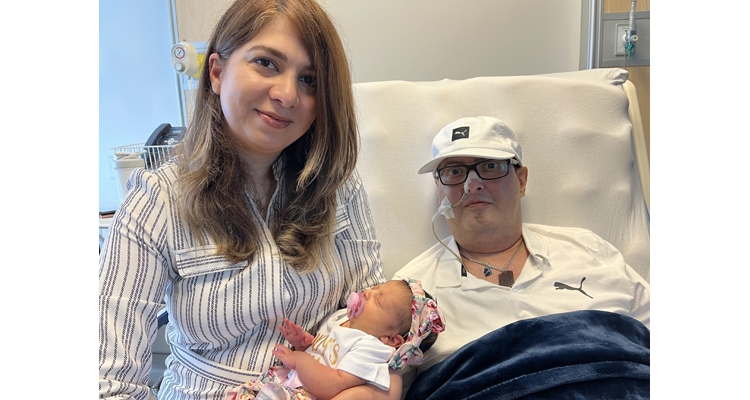Six-week-old Nika Noroozi has spent her entire life on the adult cancer ward at the McGill University Health Centre (MUHC). To explain why, we need to go back to nearly a year before her birth.
Nika’s parents, Sooran Noroozi and Samaneh Poursaman, will never forget June 16, 2022. Sooran had noticed a concerning lump on his abdomen, and was going to see a doctor. On his way to the appointment, he confided in Samaneh his worries that it could be cancer.
“I told him that not every single thing could be cancer,” says Samaneh. “And even if it was, it’s not such a big word anymore—there are advancements in science and treatment.”
Sadly, Sooran’s hunch was correct. After seeing a doctor and going through several tests, the family received a call to go to the emergency room right away. The scans had revealed a large mass in his abdomen, which turned out to be a rare cancer called sarcoma. Within a few months, Sooran was in surgery to have the tumour removed. The procedure was successful, and the couple were able to return to their busy lives.
“After Sooran recovered from surgery, the doctors told him everything was back to normal. We were so happy,” says Samaneh.
Elated, the couple began to make plans for the future. Sooran put the finishing touches on his PhD thesis in engineering, and the couple became pregnant with their first child. In December 2022, Sooran successfully defended his PhD. Just days later, he was back in the emergency room. Tests revealed the couple’s worst fear—the cancer had returned.
“The second time it was even more difficult because we were in such happy days. Sooran had just finished his PhD with great comments and we had our baby on the way. Everything was planned out and going forward,” says Samaneh.
Sooran’s illness advanced quickly and he was admitted to the MUHC’s cancer ward on February 1, 2023. Samaneh never left his side. The couple spent every moment together and prepared to welcome their daughter to the world. Nearly four months later, Samaneh went into labour. Determined to witness the birth of his daughter, Sooran asked the MUHC’s staff to wheel him from his room to the MUHC’s birthing centre.
“Little Nika is surrounded by love –
From her parents, her grandmothers,
And he many MUHC staff members
Who are helping the family stay
Together during this difficult time.”
“The moment he came to the room, I burst into tears. He was there for the whole experience. He got to cut the cord and have skin-to-skin contact with our daughter. Just having him there, all the problems in my mind were solved,” says Samaneh.
It was a beautiful and emotional moment for the young family, one that was made possible thanks to the compassion of the MUHC’s staff. After over 100 days of getting to know Sooran and Samaneh, they were honoured to help Sooran witness the birth of his daughter.
“We were all happy to accommodate his wishes,” says Dr. Ramy Saleh, Sooran’s oncologist and a sarcoma specialist at the MUHC.
Determined to keep her family together, Samaneh worked alongside the MUHC’s staff to bring Nika to the cancer ward. In a first for the MUHC, the family is living full-time in Sooran’s room. An extra bed and bassinet were provided, and the room is adorned with photos of the couple—happy memories from before Sooran’s diagnosis.
“The most important thing for us has always been to stay together. It’s not home here, but it’s home in the sense that home is where we are together all the time. The hospital staff went above and beyond to make that happen,” says Samaneh.
“We get to see each other every day, and that helps me be more positive,” adds Sooran.
The MUHC even helped arrange visas to bring both of Nika’s grandmothers to Canada from Iran. Both are at the hospital daily to help with the baby and their presence is a great comfort for the young family.
“Without them, none of this would be possible. We’re so lucky to have them both here,” says Samaneh.
Sarcoma is a rare and difficult-to-treat cancer that most often affects people aged 16–40. A disease of the muscles, bones and connective tissue, this complex cancer has few treatment options because of its rarity—pharmaceutical companies are not willing to invest time and money into a disease that is so uncommon. Sarcoma is the disease that took Canadian icon Terry Fox’s leg, and eventually his life. Shockingly, treatment options for the disease have barely changed since Terry’s Marathon of Hope in 1980, over 40 years ago.
Dr. Ramy Saleh has seen too many young people lose their lives to sarcoma. Determined to help more of his patients overcome this terrible disease, he is launching the Sarcoma Research Consortium of Quebec (SaRC-Q). This new program will bring sarcoma research and care under one umbrella across the province, helping more patients access innovative treatments.
“SaRC-Q is about sharing knowledge among specialists to provide the best care possible throughout the province. Our main priority is to make sure that patients who are diagnosed with sarcoma know about all the clinical trials going on in the province,” says Dr. Saleh.
Clinical trials are often the key to beating sarcoma—with so few established treatment options, brand new treatments available through clinical trials are sometimes a patient’s last hope. The MUHC Foundation is raising funds to support SaRC-Q and ensure the 250–300 people diagnosed with sarcoma in Quebec each year have access to cutting-edge treatments that could save their lives.
Though SaRC-Q is still on the horizon, Sooran has benefited from the expert and compassionate care of Dr. Saleh. Most important of all, he has had the opportunity to spend every day with his baby daughter as he goes through treatment.
“I feel lucky to have such a beautiful daughter,” says Sooran.
Nicknamed the D10 baby for the floor where she lives, little Nika is surrounded by love—from her parents, her grandmothers, and the many MUHC staff members who are helping the family stay together during this difficult time. In the face of uncertainty, love and togetherness give the Noroozi family hope.
You can help the MUHC Foundation fundraise to ensure better care for the hundreds of young people diagnosed with sarcoma each year. To learn more about the Sarcoma Research Consortium of Quebec (SaRC-Q) and to donate, visit https://muhcfoundation.com/works/new-hope-for-sarcoma-patients


